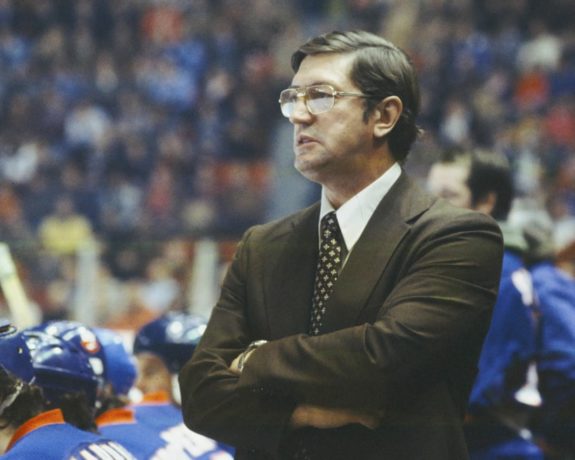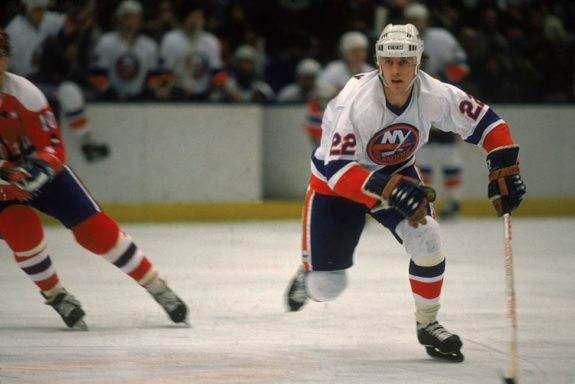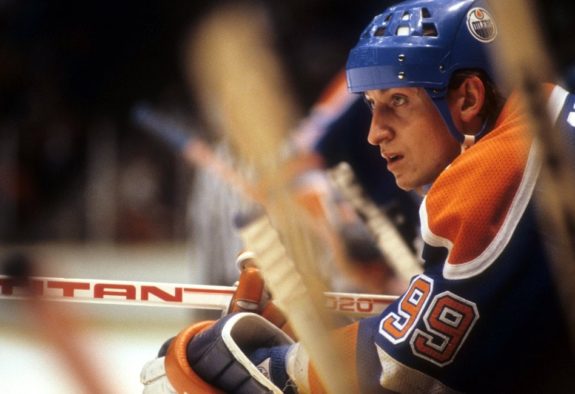The ’12 Days of Christmas’ is a classic holiday song first published in its current form in 1908. In a nod to the classic carol, join The Hockey Writers as we count down the 12 Days of Hockeymas. Each day, we will provide you with a piece of hockey history as we eagerly await the start of the 2020-21 NHL season.
Just seven seasons after the birth of the franchise, the New York Islanders were already vying for a Stanley Cup.
Head coach Al Arbour and general manager Bill Torrey had drafted and constructed a roster that was bound to dominate throughout the NHL for years. The 1978-79 season was promising, finishing the season with the best record in the NHL. A dominating performance from Bryan Trottier, who eventually claimed the Hart and Art Ross Trophies, had Islanders fans confident heading into the playoffs.

The Islanders swept the Chicago Blackhawks in the first round of the ’79 playoffs, however, the second round wasn’t as easy. In fact, Arbour and Co. dropped the series 4-2 in six games to the New York Rangers.
1979-80
Coach Arbour decided after the disappointing second-round exit that he was no longer going to concern himself with the team’s regular-season performance, but rather focus on their playoff performance. As a result, the Islanders fell below the 100-point mark for the first time in five seasons, tracking into the playoffs with 91-points. However, Torrey added a new face to the Islanders, trading longtime and popular veterans Billy Harris and defenseman Dave Lewis to the Los Angeles Kings for second-line center Butch Goring.
Known as the “final piece of the puzzle,” Goring played a major role for the Islanders moving forward. The Isles dominated their way through Goring’s former club in the first round of the playoffs. In a five-game series, Billy Smith led the Isles winning all three games in net. Chico Resch dropped Game 2 on Long Island.
The Islanders then pushed past the Boston Bruins and Buffalo Sabres in the quarter and semifinals, punching their ticket to the Stanley Cup Final. Face-to-face with the Philadelphia Flyers, the Isles took the series 4-2 and claimed the franchise’s first-ever Stanley Cup. Bobby Nystrom, already known for his overtime heroics was back at it again, scoring at 7:11 of overtime, on assists by John Tonelli and Lorne Henning to help claim hockey’s top prize.
The Game 6 victory was the Islanders sixth overtime win in the playoffs. It was also the first time a European (Nystrom, Stefan Persson, Anders Kallur) won the Stanley Cup in NHL history.
1980-81
The 1980-81 season brought more dominance, this time including the regular season as well. The Islanders skated to a 48-18-14 record, placing both first in the Patrick Division and the Campbell Conference. Mike Bossy made history when he became the third ever player to score 50 goals in 50 games in the NHL.

En-route to claiming the Stanley Cup against the Minnesota North Stars, the Islanders only lost three playoff games throughout the entire postseason. Goring, continuing to prove his worth as the “final piece,” won the Conn Smythe, and Isles fans had some fun at the expense of Rangers fans, chanting “1940” in reference to their last cup win.
1981-82
A 15-game win streak set a (then) record for the franchise as the longest win streak since their inaugural season in 1972. Claiming first in the Wales Conference and the Patrick Division, the Islanders tallied 118 points and claimed the President’s Trophy one again. Bossy was back at it again, setting a scoring record for right-wingers with 147 points in 80 games.
Despite claiming the honor of the NHL’s top team, the Islanders stumbled out of the first round. After taking a 2-0 lead in the five-game series, the Penguins forced their way back into the series, as it went the distance. It took a game 5 overtime, but John Tonelli sealed the deal for the Islanders, sending the team to the next round.
The following series proved to be another test for Arbour’s Islanders, as the series went six games against the Rangers, however, Dave Langevin’s Game 6, third-period goal, clinched the series. Despite the tough road in the first two rounds, it was smooth sailing from then on.
Taking on the Quebec Nordiques, the Islanders made quick work of their opponents, sweeping the Nords in four games. They moved on to the Stanley Cup Final for the third time in three years, to take on the Vancouver Canucks. In their first-ever coast-to-coast playoff series, the Isles kept the brooms out and swept the Canucks to claim their third straight Stanley Cup. After being upended by Tiger Williams in Game 4 of the series, Bossy got his revenge by netting the game-winning goal and being named the Conn Smythe recipient for the ’81-’82 playoffs.
1982-83
Although the Islanders had just claimed three straight Stanley Cups, all of the attention in 1982-83 was set on the Edmonton Oilers. Wayne Gretzky began to make his mark around the NHL, shattering record after record. The Oilers finished the season with a better record than the Islanders, and it seemed like there might be a new powerhouse to claim the cup and end the three-season reign of the Islanders.

In fact, many hadn’t even considered the Islanders the favorite to win the cup, despite not having lost a playoff series since 1979.
“Never count out a champion,” said Ken Morrow, a stalwart defenseman for those Islanders teams and now their director of pro scouting. “Once you’ve done it, there’s a confidence that comes out and you’re able to raise your game to another level when you have to.”
The Islanders made quick work of the Washington Capitals, sweeping their division rival in four games, then advanced two more times, beating the Bruins and the Rangers in six games each series, to take on the Oilers in the final.
Despite having five players with 96 points or more (Gretzky, 196; Mark Messier, 106; Glenn Anderson and Jari Kurri, 104; Paul Coffey, 96), the Islanders were able to best the Oilers with stellar goaltending from Smith, and top-notch defense led by captain, Denis Potvin.
“Without a doubt, they shut us down defensively,” said Gretzky, who was the leading scorer in the playoffs with 38 points (12 goals, 26 assists) but was held to no goals and 16 shots in the Final. “When we did break them down, and get by them, Smith was always there to make the big save.”
After scoring 424 regular-season goals, the Oilers could only manage six goals in the ’82-’83 final. A sweep that no one saw coming, the Islanders claimed their fourth consecutive Stanley Cup, humbling the young, upstart Oilers. Smith was honored with the Conn Smythe, and suddenly there was very little question about who the powerhouse team of the NHL was.
The 1982-83 Islanders were voted the 7th greatest team in NHL history by NHL.com in 2017.
“We’re not the New York Yankees,” Goring said. “We don’t go running around telling everyone how great we are. We just go out on the ice every night and show how good we are.”
The following season, the Oilers got their revenge against the Islanders in a finals rematch, spelling the end to the dynasty that was the Islanders. However, history was made, and there has not been a team to win four consecutive cups since.
With the new 56-game NHL schedule agreed upon, Islanders fans are hoping for a little bit of the magic that the dynasty era team saw this holiday season. After advancing to the Eastern Conference Final, current head coach, Barry Trotz, and Co. will take a page out of the dynasty book, learn from their history, and hope to advance to the Final for the first time since 1984.
Want more Islanders content? Check out the Nassaumen Hockey Podcast, hosted by The Hockey Writers authors James Nichols and Jon Zella. Follow on Apple Podcasts, Spotify, and Google Podcasts!